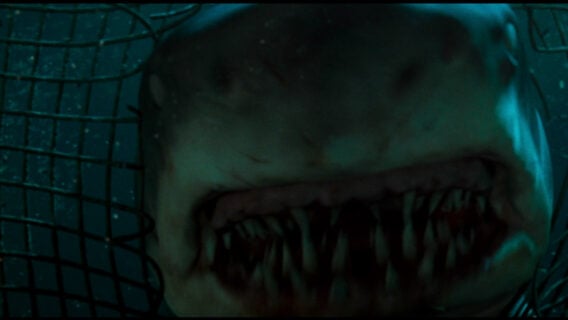
Sharksploitation remains a woefully untapped subgenre of horror. As Stephen Scarlata’s Sharksploitation documentary, premiering on Shudder July 21, contends, the killer shark subgenre has ebbed and flowed since its peak in popularity following the release of Steven Spielberg’s Jaws in June 1975. Since then, sharksploitation has shifted from animal attack copycats (Alligator), blatant Jaws mimics (Great White), big budget cheese (Deep Blue Sea), to SyFy Channel originals (Sharknado) and back again. Jaws, however, remains an elusive white, well, shark. Jaume Collet-Serra’s The Shallows perhaps come closest, though almost 50 years later, Jaws remains the pinnacle of shark attack cinema, and it’s not even close.

While Stephen Scarlata’s (Jodorowsky’s Dune) Sharksploitation gives the impression of an historical overview of the legacy of sharksploitation cinema with some conservation zest thrown in—talking heads range from filmmakers to horror critics to marine biologists—it is principally an open ocean dive into Jaws’ inimitable filmic footprint. Opening narration suggests audiences fear sharks for two key reasons; they’re in the ocean (Thalassophobia gets a shoutout) and they’re natural monsters. Historically, however, sharks were regularly depicted as spiritual, ancestral beings, with Sharksploitation wisely dedicating time to the indigenous legend of Kamohoalii, the king of all sharks, and his son Nanaue.
The historical bent is Sharksploitation’s strongest offering. A rotation of oceanographers (e.g. Gregory Stone, PhD) and filmmakers (Joe Dante, Johannes Roberts, others) dissect the lore of killer sharks, their historical shift from deity to monstrous being. Eighteenth century art (John Singleton Copley’s “Watson and the Shark”) and real-life attacks (the 1916 Jersey Shore shark attacks) were catalysts in the public’s perception of sharks not as natural components of oceanic ecosystems, but threats to summer recreation.
That burgeoning fear, of course, exploded with the release of Spielberg’s Jaws based on the novel by Peter Benchley, and in the years following, shark populations suffered a historic decline. While that remains Sharksploitation’s most compelling angle, it too often jumps sporadically around its timeline, feeling more akin to micro featurettes than a cohesive overview of shark cinema writ large. While insights into the SyFy Channel’s production process prove fascinating, they detract from the larger thesis that, fundamentally, sharks are cooler in real life than they are in movies.
It dovetails from an early suggestion that sharksploitation as subgenre is preeminently concerned with the idea of the meta shark—the toothy, bloodthirsty beast audiences envision when they think of sharks. The meta shark accounts for Deep Blue Sea’s shaky science or Jaws: The Revenge’s rogue, Michael Myers-esque shark. In making sharks killer, bigger and more violent than ever, audiences simultaneously augment cinematic thrills at the expense of shark populations globally.
Sharksploitation does, to its credit, arrive at the much-teased point that sharks matter and sharksploitation is, in some capacity, a detriment to their survival. Conservationists estimate a nearly 70% drop in populations since 1970, a figure far more terrifying than Mandy Moore in a tank full of broccoli, milk, and digital great whites. That terror can be hard to reconcile, however, with a lack of skepticism for some of the more incendiary claims. One point of interest was the death of stuntman Jose Marco while filming Shark!, a death that has been credibly debunked in recent years, though Sharksploitation exhibits no skepticism that it did not, in fact, happen.
Sharksploitation has worthy aspirations, and like the recently released King on Screen, there’s fun to be had in revisiting some of the best bad genre cinema around. There are forays into Orca, Mako: The Jaws of Death, and even Tintorera (a personal favorite), and everyone involved remains committed to offering their own unique insights. However, as a whole, Sharksploitation can feel decidedly one note, never probing deeper than the surface. There’s a whole world of fascinating sharks out there, though Sharksploitation frustratingly sticks to the shallows.
Summary
Sharksploitation is an earnest and compelling review of killer shark cinema, though audiences might wish its central thesis had more bite.
Categorized: Movie News Reviews




























